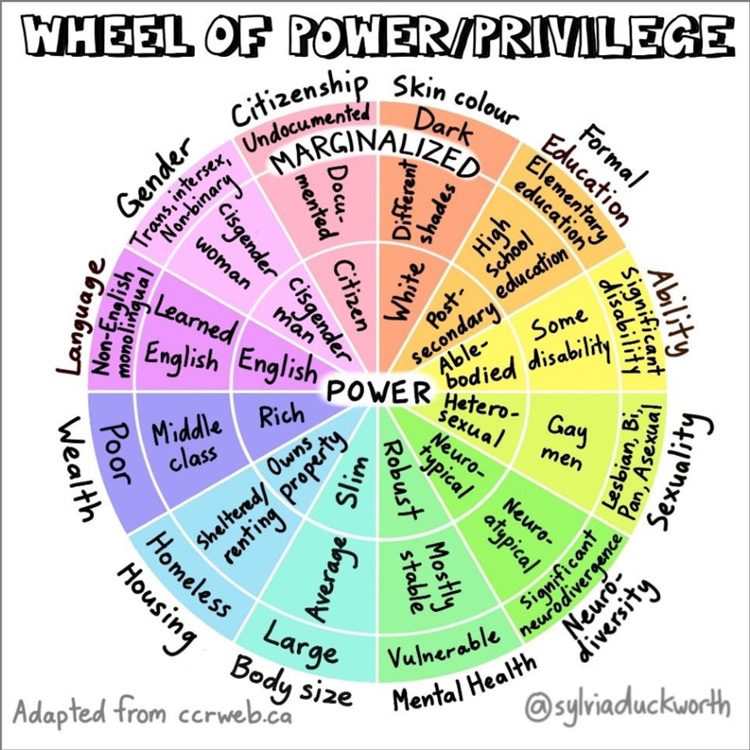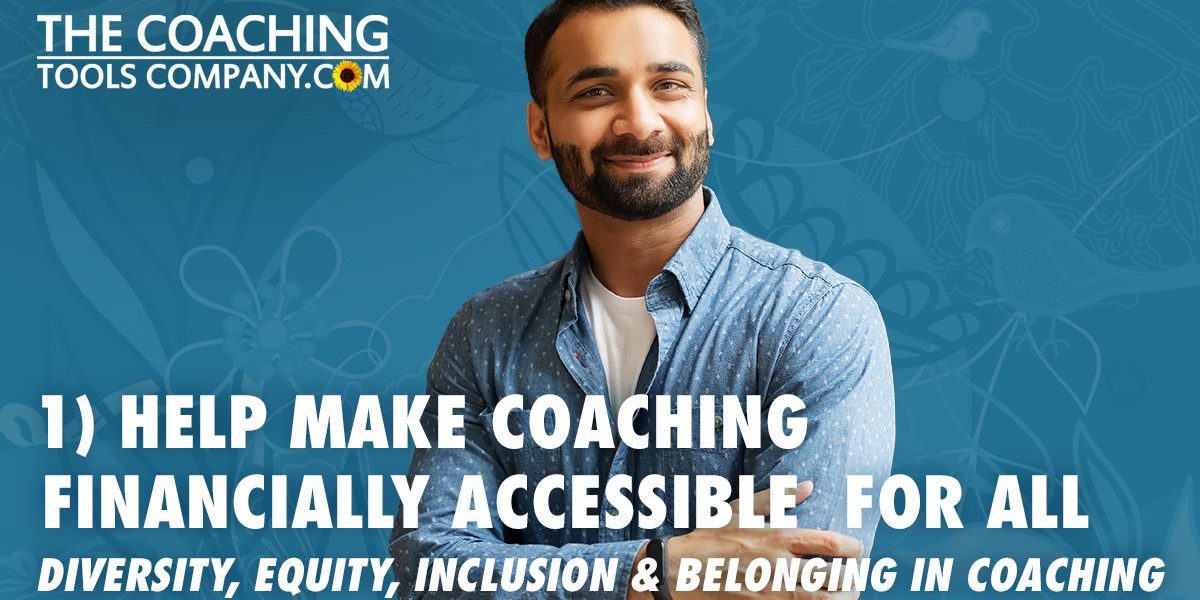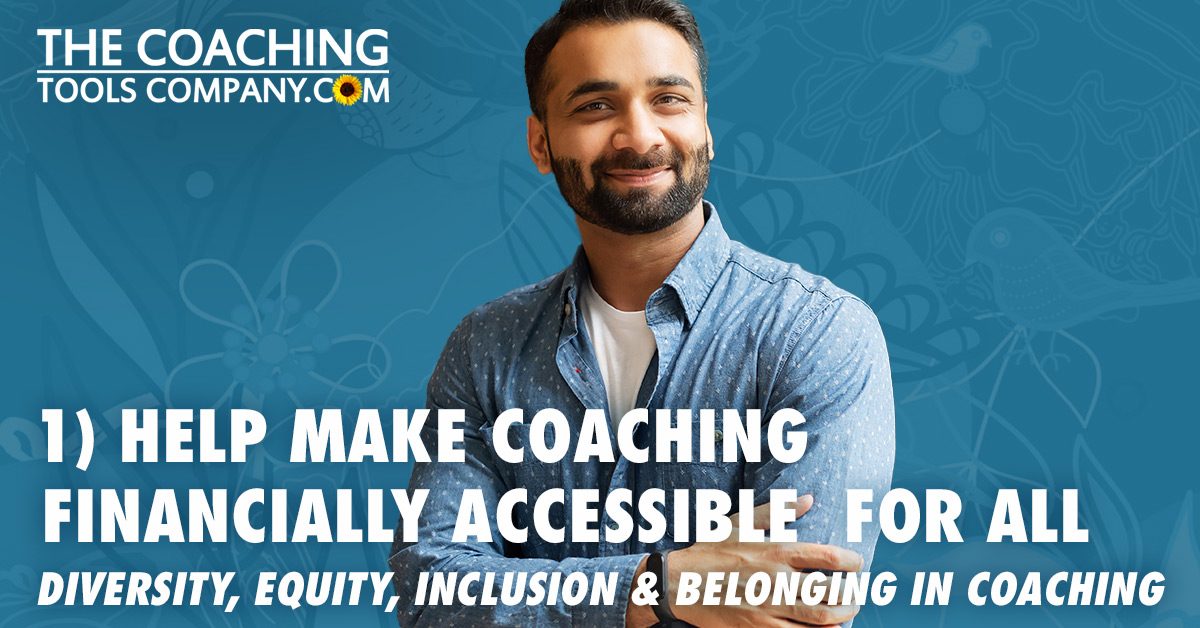Originally Posted on The Coaching Tools Company as DEIB in Coaching 6) Help Make Coaching Financially Accessible for Everyone! | Abena & Emma-Louise
Diversity is a fact. Equity is a choice. Inclusion is an action. Belonging is an outcome. Arthur Chan, Diversity, Equity, and Inclusion Strategist
We’re excited you’re here!
If you’re reading this, you’re most likely looking for ideas or wondering how coaching can be more inclusive. Yes, this topic of Diversity, Equity, Inclusion and Belonging (DEIB) can be intimidating or uncomfortable, but the more we normalise it—and approach it and ourselves with empathy—the easier it will become. Whether you agree or disagree with the points made in this article, it is our hope that reading it promotes awareness and, of course, action!
This article is part of a series where we’ve suggested 7 Ways You Can Increase (Your) Cultural Awareness in Your Coaching Practice. Here we explore Step 6) Help Make Coaching Financially Accessible for Everyone!
What’s in this ArticleIn this article we explore:
|
DEIB is about a lot more than just skin colour as we hope you’ll have seen in this article series. It includes (but is not limited to) gender, sexual orientation, size, age, country of origin, education and more. And there is one factor that spans all of these, one where minorities are usually hit harder than everyone else: access to financial resources and development opportunities.
Have you seen the Wheel of Power and Privilege?
A really interesting and useful reflection exercise is to take a look at the Wheel of Power and Privilege1.

We both love this graphic as a really powerful way to explore your own power and privilege in a larger context. Please note however that this wheel applies to what we call “Western” industrialised countries. If you’re reading from another country or part of the world, feel free to add to or amend this wheel to fit your culture.
So, where do you fit on this wheel?
Of course there will always be people who are more and less privileged than you.
The question for you is:
- What does your position on the Wheel of Power and Privilege give you?
Coaching, Personal Development and Power/Privilege
Coaching itself is a privilege. It’s a powerful opportunity for personal growth and career advancement—for those who have access.
So as we consider the Wheel of Power/Privilege in the context of your coaching, do you personally get more—or less—access to when it comes to personal development? And what about the usual people you coach?
A couple of examples:
- A middle-class White male business executive can choose from a wide range of coaches, who will all understand the challenges he faces—and money is unlikely to be an issue.
- But what would be the coaching and personal development opportunities for a Black or Hispanic single mom? How easily might they find a coach they can afford—and who can relate to them?
People who are marginalised and/or a different gender, family status, education, race or economic background will have fewer opportunities to receive coaching. And if they want to find someone who understands their experience, that limits their range of options even more.
So, what can we do to help?
We’re all so busy these days. And for many of us, our financial status may not be what we wish for.
Many coaches struggle to get their businesses off the ground and support themselves—it’s a tough business to get started in. So it can be challenging to find ways to widen access for others to our services—and still meet our own needs.
(And just to be clear, there’s nothing wrong with having high-ticket programs. If you’ve found your ideal clients and are making a great living, this is fantastic!)
But like lawyers and other professionals, coaches can also consider pro-bono or discounted rates for those who might not otherwise have access. It could just be one person, or one small thing you do. It all helps (plus it feels really good too!).
So we invite you to consider:
- How could you create a way that your services or offerings are available to those in different economic brackets?
And to help, below we share some low-cost/low-effort ways that you can help those with fewer financial resources and opportunities.
15+ ideas to support those with fewer financial resources and opportunities
What Abena & Emma-Louise do:
Abena has given discounted and free coaching sessions to those who were committed to their own development but genuinely didn’t have the financial resources to pay the usual costs. She’s also run free programs for those who might otherwise not have access, and is always open—as stated in her DEIB statement—to discussing how to make coaching accessible for individuals that contact her.
At The Coaching Tools Company, Emma-Louise has given free and discounted tools to charitable organizations as well as to coaches from non-industrialised countries. As a life coach, Emma-Louise ran free and discounted webinars and workshops for charitable and service organizations.
8 things we can all consider:
- Coaching scholarships. This could be as little as offering one coaching ‘scholarship’ a year.
- Giving free or cheap access to any online training or tools you’ve created.
- Running a free workshop or webinar.
- Offering a sliding scale/pay what you can.
- A group version of a program to make it more affordable.
- Free access to any self-study training materials.
- Price your workshop/webinar/group coaching so you can afford to give away one free spot once you hit a minimum number of registrants in the group.
- Volunteer with an organization that provides support for those with fewer financial resources eg. Refugee Jumpstart
Another way to approach this could be to have fun with the “pay it forward” model, for example:
- Coaching someone and asking them to help someone in their life in return.
- Reduce your rates for a limited time and ask that clients buy a session for someone with fewer financial resources.
- Have the option on your invoices for clients to donate any amount they wish toward a grant fund for those who need to apply for financial aid.
Follow in the footsteps of others
Organisations/people who offer a framework to support others or offer no-cost coaching include:
- Laura Markham (a parenting coach) not only trains coaches but also offers parenting courses with grants available for those who might otherwise have trouble covering the cost of this type of learning.
- Sign up with CoachMeFree.com.
- Offer your blog articles, poetry, a video, podcast and more to Become (for children in care or who have experienced the care system up to the age of 27).
- Get ideas from the Young Women’s Trust (free life and career coaching for women aged 18-30).
Do you any have ideas to add?
We also wonder if you have ideas to share and add to this article! What are you already doing to help those with fewer access to financial resources? What have you done in the past?
Do share in the comments below (or let us know if this article has given you other ideas you’d like to try).
Wrap-up
So, we hope this article has given you some ideas! As you can see, it’s totally possible to give others a helping hand on the ladder of personal development. And our experience is that these people tend to be the most invested and action-taking.
And remember supporting others with fewer resources also benefits you as you get to:
- Expand the scope of who you attract and help.
- Live into your DEI values.
- Show the world a broader picture of who you are and what you stand for, both role modelling what is possible and boosting your business “brand”.
- Enjoy helping someone/others!
And now it’s over to you!
So, what do you think? What did you learn from this article? And importantly, what will you do differently?
Remember that if you decide to start ‘diversity’ conversations with fellow coaches in person or in online spaces, you are contributing to greater awareness and a more inclusive coaching industry.
Next, watch for the final article in this series!
References1 The Wheel of Power/Privilege has a creative commons license. If you love it as we do, feel free to share providing you attribute according to the license terms. |
Where Next?
- The next article is about making (some of) your services accessible to those with fewer financial resources.
- And if you didn’t already, you might like:
- Read the introductory: 7 Ways You Can Increase (Your) Cultural Awareness in Your Coaching Practice
- Read the story of how these articles came to be here >>
- The series of 7 articles:
- 1) Identity Mapping Exercises: The Identity Iceberg (with Free .PDF Tool)
- 2) Review Your Marketing Materials (With Checklist)
- 3) Include Identity & Culture in Your Onboarding Process
- 4) Serve Marginalised Individuals/Groups
- 5) Create Your Inclusion Statement (with Free .PDF Tool)
Lastly, whilst you won’t see a disclosure in every article on our blog, we think it’s important to do so when covering this DEIB topic:
| DISCLOSURE: This article has been written from the perspective of a female who is (largely) heteronormative and of White European descent and another atypical female who is of Ghanaian, Irish, and British descent. We acknowledge that even with both our perspectives and best intentions, we may (like everyone) have blind spots and are open to discussion about these. |
So what do you think? Tell us what we missed or what else should be on these lists! What did you take away from this article? Share your thoughts in the comments below!
Author Bios
Emma-Louise Elsey has been coaching since 2003. She’s the founder of both The Coaching Tools Company.com and her latest venture, Fierce Kindness where she shares personal tips, tools and ideas to transform ourselves—and our world! Originally a project/relationship manager for Fortune 500 companies she’s combined her passion for coaching, creativity and love of systems to create 100+ brandable coaching exercises including 30 completely free coaching tools. She serves coaches through her newsletter for coaches and loves to offer ideas for your coaching toolbox! Learn more about Emma-Louise & see all their articles here >> |



 Contributing author:
Contributing author: 




